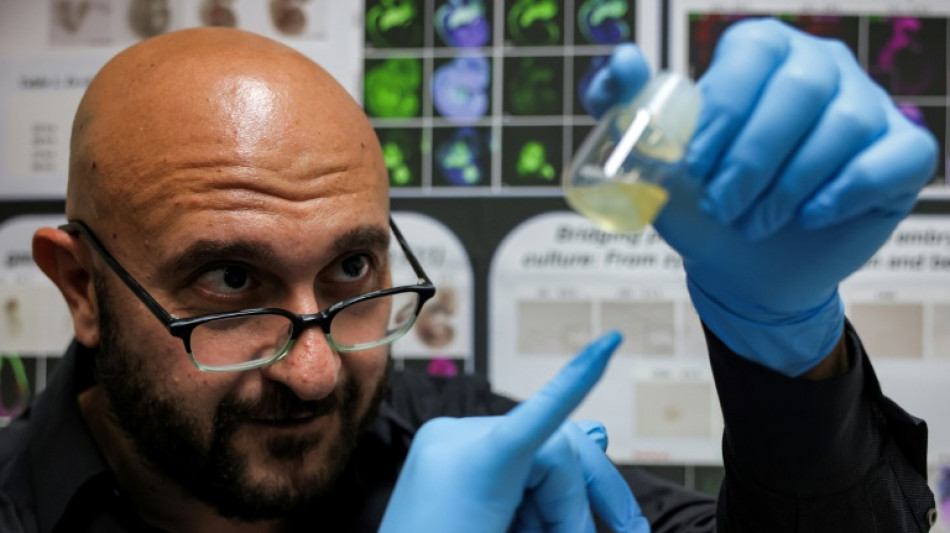
-
 Liverpool down Real Madrid in Champions League, Bayern edge PSG
Liverpool down Real Madrid in Champions League, Bayern edge PSG
-
Van Dijk tells Liverpool to keep calm and follow Arsenal's lead

-
 PSG left to sweat on injuries to Dembele and Hakimi
PSG left to sweat on injuries to Dembele and Hakimi
-
Reddit, Kick to be included in Australia's social media ban

-
 Ex-Zimbabwe cricket captain Williams treated for 'drug addiction'
Ex-Zimbabwe cricket captain Williams treated for 'drug addiction'
-
Padres ace Darvish to miss 2026 MLB season after surgery

-
 Diaz hero and villain as Bayern beat PSG in Champions League showdown
Diaz hero and villain as Bayern beat PSG in Champions League showdown
-
Liverpool master Real Madrid on Alexander-Arnold's return

-
 Van de Ven back in favour as stunning strike fuels Spurs rout
Van de Ven back in favour as stunning strike fuels Spurs rout
-
Juve held by Sporting Lisbon in stalling Champions League campaign

-
 New lawsuit alleges Spotify allows streaming fraud
New lawsuit alleges Spotify allows streaming fraud
-
Stocks mostly drop as tech rally fades

-
 LIV Golf switching to 72-hole format in 2026: official
LIV Golf switching to 72-hole format in 2026: official
-
Manchester City have become 'more beatable', says Dortmund's Gross

-
 Merino brace sends Arsenal past Slavia in Champions League
Merino brace sends Arsenal past Slavia in Champions League
-
Djokovic makes winning return in Athens

-
 Napoli and Eintracht Frankfurt in Champions League stalemate
Napoli and Eintracht Frankfurt in Champions League stalemate
-
Arsenal's Dowman becomes youngest-ever Champions League player

-
 Cheney shaped US like no other VP. Until he didn't.
Cheney shaped US like no other VP. Until he didn't.
-
Pakistan edge South Africa in tense ODI finish in Faisalabad

-
 Brazil's Lula urges less talk, more action at COP30 climate meet
Brazil's Lula urges less talk, more action at COP30 climate meet
-
Barca's Lewandowski says his season starting now after injury struggles

-
 Burn urges Newcastle to show their ugly side in Bilbao clash
Burn urges Newcastle to show their ugly side in Bilbao clash
-
French pair released after 3-year Iran jail ordeal

-
 Getty Images largely loses lawsuit against UK AI firm
Getty Images largely loses lawsuit against UK AI firm
-
Cement maker Lafarge on trial in France over jihadist funding

-
 Sculpture of Trump strapped to a cross displayed in Switzerland
Sculpture of Trump strapped to a cross displayed in Switzerland
-
Pakistan's Rauf and Indian skipper Yadav punished over Asia Cup behaviour

-
 Libbok welcomes 'healthy' Springboks fly-half competition
Libbok welcomes 'healthy' Springboks fly-half competition
-
Reeling from earthquakes, Afghans fear coming winter

-
 Ronaldo reveals emotional retirement will come 'soon'
Ronaldo reveals emotional retirement will come 'soon'
-
Munich's surfers stunned after famed river wave vanishes

-
 Iran commemorates storming of US embassy with missile replicas, fake coffins
Iran commemorates storming of US embassy with missile replicas, fake coffins
-
Gauff sweeps Paolini aside to revitalise WTA Finals defence

-
 Shein vows to cooperate with France in probe over childlike sex dolls
Shein vows to cooperate with France in probe over childlike sex dolls
-
Young leftist Mamdani on track to win NY vote, shaking up US politics

-
 US government shutdown ties record for longest in history
US government shutdown ties record for longest in history
-
King Tut's collection displayed for first time at Egypt's grand museum

-
 Typhoon flooding kills over 40, strands thousands in central Philippines
Typhoon flooding kills over 40, strands thousands in central Philippines
-
Trent mural defaced ahead of Liverpool return

-
 Sabalenka to face Kyrgios in 'Battle of Sexes' on December 28
Sabalenka to face Kyrgios in 'Battle of Sexes' on December 28
-
Experts call for global panel to tackle 'inequality crisis'
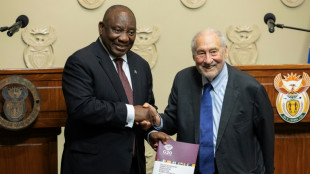
-
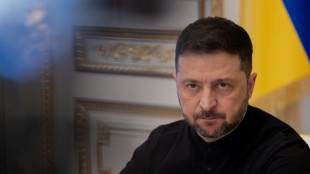 Backed by Brussels, Zelensky urges Orban to drop veto on EU bid
Backed by Brussels, Zelensky urges Orban to drop veto on EU bid
-
After ECHR ruling, Turkey opposition urges pro-Kurd leader's release

-
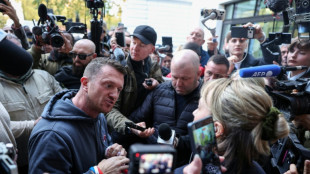 UK far-right activist Robinson cleared of terror offence over phone access
UK far-right activist Robinson cleared of terror offence over phone access
-
World on track to dangerous warming as emissions hit record high: UN

-
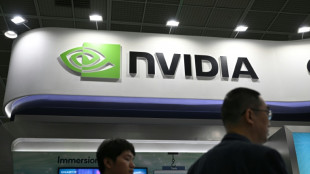 Nvidia, Deutsche Telekom unveil 1-bn-euro AI industrial hub
Nvidia, Deutsche Telekom unveil 1-bn-euro AI industrial hub
-
Which record? Haaland warns he can get even better
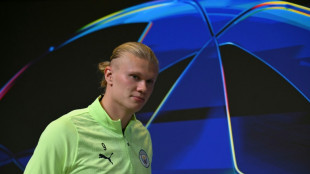
-
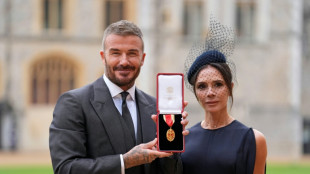 Football star David Beckham hails knighthood as 'proudest moment'
Football star David Beckham hails knighthood as 'proudest moment'
-
Laurent Mauvignier wins France's top literary award for family saga


'Synthetic embryo' breakthrough but growing human organs far off
Stem cell scientists say they have created "synthetic embryos" without using sperm, eggs or fertilisation for the first time, but the prospect of using such a technique to grow human organs for transplantation remains distant.
The breakthrough was hailed as a major step forward, though some experts said the result could not fully be considered to be embryos and warned of future ethical considerations.
In research published in the journal Cell this week, scientists at the Weizmann Institute of Science in Israel described mouse stem cells self-assembling into embryo-like structures in the lab.
The research built upon 2018 research that had a bundle of mouse stem cells self-organised into something resembling the beginnings of an embryo -- but with far fewer cells.
The Weizmann team led by Palestinian stem cell scientist Jacob Hanna went much further.
They started by collecting cells from the skin of mice, then made them artificially return to the state of stem cells.
The stem cells were then placed in a special incubator, which continuously moved to mimic a mother's womb.
The vast majority of the cells failed to form anything.
But 50 -- 0.5 percent of the 10,000 total -- collected themselves into spheres, then embryo-like structures, the researchers said.
After eight days -- around a third of the 20-day mouse gestation period -- there were early signs of a brain and a beating heart, they added.
They were described as 95 percent similar to normal mouse embryos.
"The embryo is the best organ-making machine and the best 3D bioprinter -- we tried to emulate what it does," Hanna said in a Weizmann statement.
- 'Not embryos' -
While they were the most advanced synthetic embryo-like structures ever grown, some scientists not involved in the research warned against calling them "embryos".
"These are not embryos," French stem cell scientist Laurent David told AFP.
"Until proven otherwise, they do not result in a viable individual capable of reproducing," he added.
He preferred to call them embryoids, the name for a group of cells that resemble an embryo, emphasising that they showed only the very beginnings of organs.
However, David welcomed the "very convincing" research, which he said could allow further experiments to understand exactly how organs form.
Hanna said the team's "next challenge is to understand how stem cells know what to do -- how they self-assemble into organs and find their way to their assigned spots inside an embryo".
- Ethical implications -
If human organs could one day be grown in a lab, it could provide life-saving transplants to thousands of people every year without the need for donors.
There has been progress in this new field -- several years ago researchers managed to develop an artificial intestine in the lab that could be implanted into a mouse.
For humans, however, such organ implants remain science fiction.
Still, Hanna has founded a company, Renewal Bio, that aims to find a way to use the technology for therapeutic purposes.
Researchers not involved in the study said it was very early to consider using such a technique for humans.
Alfonso Martinez Arias of Spain's Pompeu Fabra University said the breakthrough "opens the door to similar studies with human cells, though there are many regulatory hoops to get through first and, from the point of view of the experiments, human systems lag behind mouse systems".
And aiming to get similar results from human cells will likely open an ethical can of worms.
"Although the prospect of synthetic human embryos is still distant, it will be crucial to engage in wider discussions about the legal and ethical implications of such research," James Briscoe of Britain's Francis Crick Institute said.
P.Anderson--BTB




